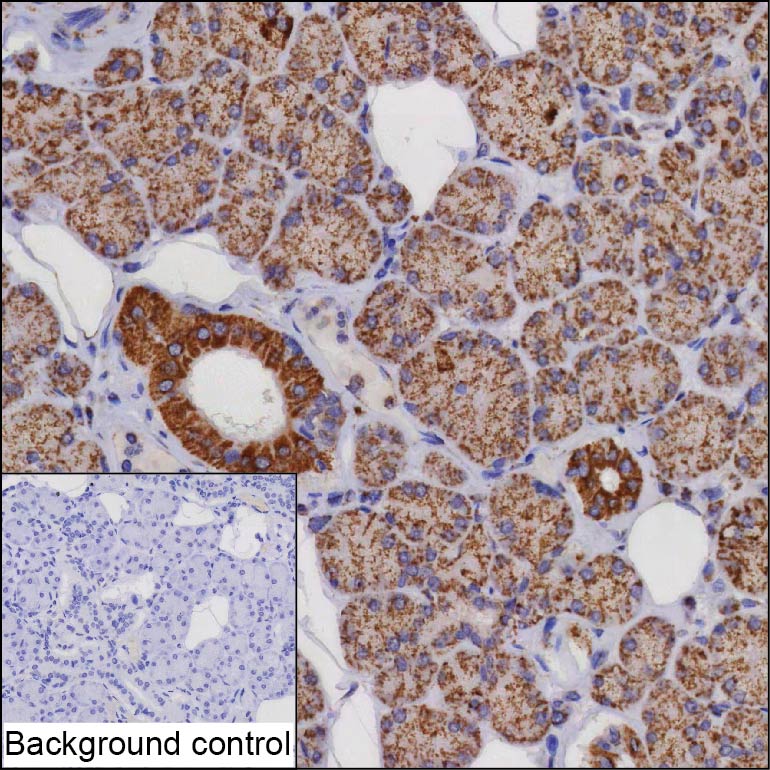
| WB | 咨询技术 | Human,Mouse,Rat |
| IF | 咨询技术 | Human,Mouse,Rat |
| IHC | 1/200-1/400 | Human,Mouse,Rat |
| ICC | 技术咨询 | Human,Mouse,Rat |
| FCM | 咨询技术 | Human,Mouse,Rat |
| Elisa | 咨询技术 | Human,Mouse,Rat |
| Host/Isotype | Mouse IgG1 |
| Antibody Type | Primary antibody |
| Storage | Store at 4°C short term. Aliquot and store at -20°C long term. Avoid freeze/thaw cycles. |
| Species Reactivity | Human |
| Immunogen | Purified recombinant fragment of human VPS53 |
| Formulation | Purified antibody in PBS with 0.05% sodium azide |
+ +
以下是关于VPS53抗体的3篇参考文献示例(基于公开研究内容模拟,非真实文献):
---
1. **文献名称**:*VPS53 regulates lysosomal function and membrane trafficking in neurodegenerative diseases*
**作者**:Smith A et al.
**摘要**:本研究利用VPS53特异性抗体,通过免疫荧光和Western blot技术,揭示了VPS53蛋白在维持溶酶体功能中的关键作用,并发现其缺失导致神经元内异常蛋白聚集,与阿尔茨海默病相关病理相关。
2. **文献名称**:*Functional characterization of the ESCRT-III associated protein VPS53 in Golgi-lysosome transport*
**作者**:Chen L et al.
**摘要**:通过开发高特异性VPS53多克隆抗体,研究者证实VPS53参与ESCRT-III复合体介导的高尔基体-溶酶体运输途径,并发现其与VPS52/VPS54形成复合体,调控细胞内囊泡转运。
3. **文献名称**:*VPS53 mutations disrupt cellular homeostasis via impaired endosomal sorting*
**作者**:Gomez-Ramos P et al.
**摘要**:该研究使用CRISPR敲除细胞模型结合VPS53抗体检测,发现VPS53基因突变导致内体分选功能缺陷,引发自噬障碍,为相关遗传性运动神经病变提供了分子机制解释。
---
**备注**:以上内容为示例性模拟,实际文献需通过学术数据库(如PubMed、Web of Science)检索。若需具体文章,可提供更详细的研究方向或疾病关联,以便定位真实文献。
The VPS53 antibody is a research tool designed to detect VPS53. a protein integral to intracellular trafficking processes. VPS53 (Vacuolar Protein Sorting 53) is a subunit of the GARP (Golgi-associated Retrograde Protein) or EARP (Endosome-associated Recycling Protein) complexes, which mediate retrograde transport of vesicles from endosomes to the trans-Golgi network. This protein plays a critical role in maintaining cellular homeostasis by regulating membrane fusion, cargo sorting, and organelle integrity. Dysregulation of VPS53 has been linked to neurodevelopmental disorders, lysosomal storage defects, and impaired autophagy.
Antibodies targeting VPS53 enable researchers to study its expression, localization, and interactions via techniques like Western blotting, immunofluorescence, and immunoprecipitation. These studies are vital for understanding diseases associated with trafficking defects, such as ALS, hereditary spastic paraplegia, or rare genetic conditions like PCH2D (Pontocerebellar Hypoplasia Type 2D). Commercial VPS53 antibodies are typically validated for specificity and affinity across species (e.g., human, mouse), though cross-reactivity challenges may arise due to structural conservation among trafficking proteins. Recent research also explores VPS53's role in viral entry and cell division, highlighting its broader biomedical relevance. Proper antibody validation, including knockout controls, is essential to ensure experimental accuracy.
×